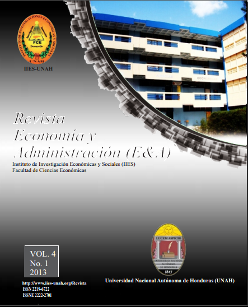Social Networks as a media to support the higher education in Latin America: a Tegucigalpa, Honduras case
DOI:
https://doi.org/10.5377/eya.v4i1.4332Keywords:
Social Network, High Education, Virtual EducationAbstract
As in most economic sectors generating goods and services, Higher Education (HE) is having a major shift in the economic structure of countries, due to the design and integration of ICT's in their work and daily actions. Conceiving globalizing adapt to changes that allow the internal structure of adaptation and assimilation of such changes, being also affected the form of interaction-linkage with economic operators.
This process could not have happened without the constant inventions and technological innovations that allow society to accelerate the learning curve as the curve of development. And implementing them in many areas, is like so that implementation can lead to the educational field, specifically in the ES, with all these developments has generated a new paradigm in education, but with some impasses. This paradigm does envision an education freer, more focused on the student, more personalized and more interactive, which slows a reality that developing countries should be subject to important decision makers in order to reduce the gap digital distance threshold of development between developing and developed countries.
Downloads
1728
Downloads
Published
How to Cite
Issue
Section
License
Los autores que publican en esta revista están de acuerdo con los siguientes términos:
- Los autores conservan los derechos de autor y garantizan a la revista el derecho de ser la primera publicación del trabajo al igual que licenciado bajo una Creative Commons Attribution License que permite a otros compartir el trabajo con un reconocimiento de la autoría del trabajo y la publicación inicial en esta revista.
- Los autores pueden establecer por separado acuerdos adicionales para la distribución no exclusiva de la versión de la obra publicada en la revista (por ejemplo, situarlo en un repositorio institucional o publicarlo en un libro), con un reconocimiento de su publicación inicial en esta revista.
- Se permite y se anima a los autores a difundir sus trabajos electrónicamente (por ejemplo, en repositorios institucionales o en su propio sitio web) antes y durante el proceso de envío, ya que puede dar lugar a intercambios productivos, así como a una citación más temprana y mayor de los trabajos publicados (Véase The Effect of Open Access) (en inglés).




